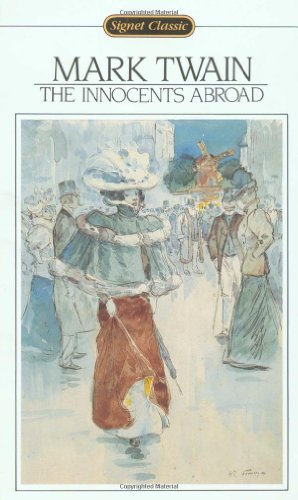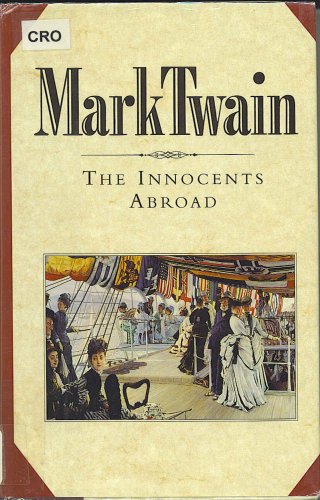-
The Innocents Abroad
Mark Twain
Paperback (CreateSpace Independent Publishing Platform, May 22, 2018)Known as one of American literature's finest humor writers, Mark Twain took on the travel genre in the series of essays, sketches, and observations collected in The Innocents Abroad. From classic fish-out-of-water shenanigans to keen insight into the differences between American culture and its European and Middle Eastern counterparts, this volume is an engaging and rewarding read. Z
Z
-
The Innocents Abroad
Mark Twain
language (, Jan. 18, 2018)The Innocents Abroad by Mark Twain
-
The Innocents Abroad
Mark Twain
eBook (, May 28, 2020)The Innocents Abroad, or The New Pilgrims' Progress is a travel book by American author Mark Twain published in 1869 which humorously chronicles what Twain called his "Great Pleasure Excursion" on board the chartered vessel Quaker City (formerly USS Quaker City) through Europe and the Holy Land with a group of American travelers in 1867. It was the best-selling of Twain's works during his lifetime, as well as one of the best-selling travel books of all time.A major theme of the book is that of the conflict between history and the modern world. Twain continually encounters petty profiteering and trivializations of history as he journeys, as well as a strange emphasis placed on particular past events. He is either outraged, puzzled, or bored by each encounter. One example can be found in the sequence during which the boat has stopped at Gibraltar. On shore, the narrator encounters seemingly dozens of people intent on regaling him, and everyone else, with a bland and pointless anecdote concerning how a particular hill nearby acquired its name, heedless of the fact that the anecdote is, indeed, bland, pointless, and entirely too repetitive. Another example may be found in the discussion of the story of Abelard and Heloise, where the skeptical American deconstructs the story and comes to the conclusion that far too much fuss has been made about the two lovers. Only when the ship reaches areas of the world that do not exploit for profit or bore passers-by with inexplicable interest in their history, such as the passage dealing with the ship's time at the Canary Islands, is this attitude not found in the text.Illustration (1855): "We reached Mount Tabor safely ... we never saw a human being on the whole route ... We climbed the steep path to its summit, through breezy glades of thorn and oak. The view presented from its highest peak was almost beautiful. Below, was the broad, level plain of Esdraelon, checkered with fields like a chess-board, and full as smooth and level, seemingly; dotted about its borders with white, compact villages, and faintly penciled, far and near, with the curving lines of roads and trails." Mark Twain, 1867This reaction to those who profit from the past is found, in an equivocal and unsure balance with reverence, in Twain's experiences in the Holy Land. The narrator reacts here, not only to the exploitation of the past and the unreasoning (to the American eye of the time) adherence to old ways, but also to the profanation of religious history. Many of his illusions are shattered, including his discovery that the nations described in the Old Testament could easily fit inside many American states and counties, and that the "kings" of those nations might very well have ruled over fewer people than could be found in some small towns. Disillusioned, he writes, “If all the poetry and nonsense that have been discharged upon the fountains and the bland scenery of this region were collected in a book, it would make a most valuable volume to burn.”This equivocal reaction to the religious history the narrator encounters may be magnified by the prejudices of the time, as the United States was still primarily a Protestant nation at that point. The Catholic Church, in particular, receives a considerable amount of attention from the narrator, specifically its institutionalized nature. This is particularly apparent in the section of the book dealing with Italy, where the poverty of the lay population and the relative affluence of the church are contrasted.
-
Innocents Abroad
Mark Twain, Leslie A. Fiedler
Mass Market Paperback (Signet Classics, Feb. 1, 1966)This work has been selected by scholars as being culturally important, and is part of the knowledge base of civilization as we know it. This work was reproduced from the original artifact, and remains as true to the original work as possible. Therefore, you will see the original copyright references, library stamps (as most of these works have been housed in our most important libraries around the world), and other notations in the work.This work is in the public domain in the United States of America, and possibly other nations. Within the United States, you may freely copy and distribute this work, as no entity (individual or corporate) has a copyright on the body of the work.As a reproduction of a historical artifact, this work may contain missing or blurred pages, poor pictures, errant marks, etc. Scholars believe, and we concur, that this work is important enough to be preserved, reproduced, and made generally available to the public. We appreciate your support of the preservation process, and thank you for being an important part of keeping this knowledge alive and relevant. Z
Z
-
The Innocents Abroad
Mark Twain
language (, Feb. 25, 2019)The Innocents Abroad, or The New Pilgrims' Progress is a travel book by American author Mark Twain published in 1869 which humorously chronicles what Twain called his "Great Pleasure Excursion" on board the chartered vessel Quaker City (formerly USS Quaker City) through Europe and the Holy Land with a group of American travelers in 1867. It was the best-selling of Twain's works during his lifetime, as well as one of the best-selling travel books of all time.
-
The Innocents Abroad
Mark Twain
eBookThe Innocents Abroad, or The New Pilgrims' Progress is a travel book by American author Mark Twain published in 1869 which humorously chronicles what Twain called his "Great Pleasure Excursion" on board the chartered vessel Quaker City (formerly USS Quaker City) through Europe and the Holy Land with a group of American travelers in 1867. It was the best-selling of Twain's works during his lifetime,as well as one of the best-selling travel books of all time.
-
The Innocents Abroad
Mark Twain
Hardcover (Franklin Classics Trade Press, Oct. 29, 2018)This work has been selected by scholars as being culturally important and is part of the knowledge base of civilization as we know it.This work is in the public domain in the United States of America, and possibly other nations. Within the United States, you may freely copy and distribute this work, as no entity (individual or corporate) has a copyright on the body of the work.Scholars believe, and we concur, that this work is important enough to be preserved, reproduced, and made generally available to the public. To ensure a quality reading experience, this work has been proofread and republished using a format that seamlessly blends the original graphical elements with text in an easy-to-read typeface.We appreciate your support of the preservation process, and thank you for being an important part of keeping this knowledge alive and relevant.
-
The Innocents Abroad
Mark Twain
eBook (HarperTorch, July 28, 2015)In The Innocents Abroad, acclaimed American novelist and humorist Mark Twain documents his impressions of Europe, the Holy Land, and his fellow travellers during his “Great Pleasure Excursion” aboard the ship Quaker City in 1867.Although Mark Twain is best-known in modern times for his literary classics The Adventures of Tom Sawyer and The Adventures of Huckleberry Finn, during his lifetime Twain was better known for his travel-writing, of which The Innocents Abroad was his best-selling.HarperTorch brings great works of non-fiction and the dramatic arts to life in digital format, upholding the highest standards in ebook production and celebrating reading in all its forms. Look for more titles in the HarperTorch collection to build your digital library.
-
The Innocents Abroad
Mark Twain
Hardcover (Book-of-the-Month Club, July 6, 1992)"Who could read the programme for the excursion without longing to make one of the party?" So Mark Twain acclaims his voyage from New York City to Europe and the Holy Land in June 1867. His adventures produced The Innocents Abroad, a book so funny and provocative it made him an international star for the rest of his life. He was making his first responses to the Old World - to Paris, Milan, Florence, Venice, Pompeii, Constantinople, Sebastopol, Balaklava, Damascus, Jerusalem, Nazareth, and Bethlehem. For the first time he was seeing the great paintings and sculptures of the Old Masters . He responded with wonder and amazement, but also with exasperation, irritation, disbelief. Above all he displayed the great energy of his humour, more explosive for us now than for his beguiled contemporaries.
-
The Innocents Abroad
Mark Twain
language (Strelbytskyy Multimedia Publishing, Nov. 9, 2018)The Innocents Abroad, or The New Pilgrims' Progress is a book by a classic of the American literature, Mark Twain.This very book started his literary career. A young journalist spent six months on board of "Quaker City" with his fellow countrymen who went on a journey to Europe and the Holy land. They were in Morocco, Venice, Rome, Paris, Jerusalem and Odessa, crossed the Atlantic twice and came ashore in the New-York harbour safe and sound. This story about travelling has the aim to show a reader what Europe and East would look like if he (or she) saw them with his (her) own eyes, rather than with the eyes of someone who had been there before.
-
The Innocents Abroad
Mark Twain
language (Classical Revival Press, Feb. 27, 2017)The Innocents Abroad, or The New Pilgrims' Progress is a travel book by American author Mark Twain published in 1869 which humorously chronicles what Twain called his "Great Pleasure Excursion" on board the chartered vessel Quaker City (formerly USS Quaker City) through Europe and the Holy Land with a group of American travelers in 1867. It was the best-selling of Twain's works during his lifetime, as well as being one of the best-selling travel books of all time.
-
Innocents Abroad
Mark Twain
Hardcover (American Publishing Co., San Francisco & Hartlford, July 6, 1869)First edition by Mark Twain. In readable condition. Some damage to the cover. I have seen one page that has damage onto the words. some staining due to age and a torn binding (torn piece included). A few pages are loose as well.